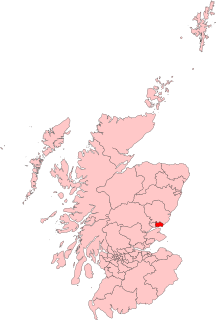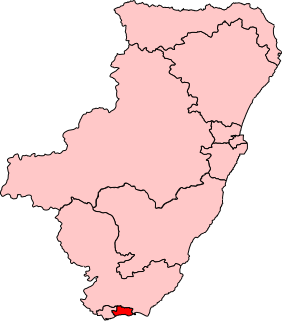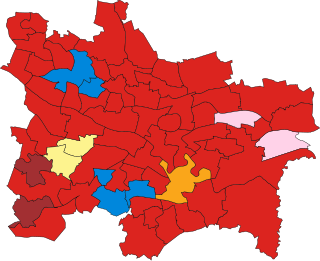
Dundee is Scotland's fourth-largest city and the 51st-most-populous built-up area in the United Kingdom. The mid-year population estimate for 2016 was 148,270, giving Dundee a population density of 2,478/km2 or 6,420/sq mi, the second-highest in Scotland. It lies within the eastern central Lowlands on the north bank of the Firth of Tay, which feeds into the North Sea. Under the name of Dundee City, it forms one of the 32 council areas used for local government in Scotland.
The Labour Party of Scotland was a minor Scottish nationalist political party that was active in the early 1970s. Formed as a left-wing breakaway from Dundee's branch of the Scottish National Party (SNP), it is perhaps best known for standing in the Dundee East by-election of 1973, where its interference split the nationalist vote and probably cost the SNP a parliamentary seat as a result. The party contested elections to Dundee City Council two months later but was ultimately unsuccessful. It folded soon after, and by early 1974 most of its membership had returned to the SNP, whose campaigns on North Sea oil were proving popular with Scotland's urban electorate. It never had any official political representation.

Dundee East is a constituency of the House of Commons of the Parliament of the United Kingdom. Created for the 1950 general election, it elects one Member of Parliament (MP) by the first-past-the-post voting system.

Dundee West is a constituency of the House of Commons of the Parliament of the United Kingdom. It elects one Member of Parliament (MP) by the first-past-the-post voting system.
Kate Maclean is a Scottish Labour politician, and was the Member of the Scottish Parliament for Dundee West constituency from 1999 to 2007.

Dundee City East is a constituency of the Scottish Parliament (Holyrood). It elects one Member of the Scottish Parliament (MSP) by the first past the post method of election. Also, however, it is one of ten constituencies in the North East Scotland electoral region, which elects sevenadditional members, in addition to ten constituency MSPs, to produce a form of proportional representation for the region as a whole.

Dundee West was a constituency of the Scottish Parliament (Holyrood). It elected one Member of the Scottish Parliament (MSP) by the first past the post method of election. Also, however, it is one of nine constituencies in the North East Scotland electoral region, which elects seven additional members, in addition to nine constituency MSPs, to produce a form of proportional representation for the region as a whole.

Politics in the Dundee Citycouncil area are evident in the deliberations and decisions of Dundee City Council, in elections to the council, and in elections to the Scottish Parliament (Holyrood) and the House of Commons of the Parliament of the United Kingdom (Westminster).

Elections to Dundee City Council were held on 3 May 2007, the same day as the other Scottish local government elections and the Scottish Parliament general election.
Mervyn J. Rolfe CBE was the Provost and Lord Lieutenant of the City of Dundee from 1996 to 1999. During this period he chaired the Dundee City of Discovery Campaign which launched the Dundee International Book Prize in 1996 and won the Scottish Marketing Awards Grand Prix in 1999 for promion of the image of Dundee.

Dundee East was a constituency of the Scottish Parliament (Holyrood). It elected one Member of the Scottish Parliament (MSP) by the first past the post method of election. Also, however, it was one of nine constituencies in the North East Scotland electoral region, which elects sevenadditional members, in addition to nine constituency MSPs, to produce a form of proportional representation for the region as a whole.
The Dundee West by-election was held on 21 November 1963 due to the death of the incumbent Labour MP John Strachey. It was won by the Labour candidate, Peter Doig.

Elections to Dundee City Council were held on 1 May 2003, the same day as the other Scottish local government elections and the Scottish Parliament general election.
Elections to Dundee City Council were held on 1 May 1973, the same day as the other Scottish local government elections. Of the councils 36 seats, 13 were up for election.

The 1995 City of Dundee District Council election took place on 6 April 1995 to elect members of City of Dundee Council, as part of that years Scottish local elections. These were the first elections for the new unitary authority of the City of Dundee Council. The council subsequently renamed itself in May 1995 as Dundee City Council.

The 1999 City of Dundee District Council election took place on 6 May 1999 to elect members of City of Dundee Council, as part of that years Scottish local elections.
The 1974 City of Dundee District Council election took place on 8 May 1974 to elect members of City of Dundee Council, as part of that years Scottish local elections.
The 1988 City of Dundee District Council election took place on 5 May 1988 to elect members of City of Dundee Council, as part of that year's Scottish local elections.

Elections for the City of Glasgow District Council took place in May 1992, alongside elections to the councils of Scotland's various other districts.

Elections to Dundee City Council were held on 4 May 2017 on the same day as the other Scottish local government elections. The election used the eight wards created as a result of the Local Governance (Scotland) Act 2004, with each ward electing three or four Councillors using the single transferable vote system. A total of 29 Councillors were elected.














